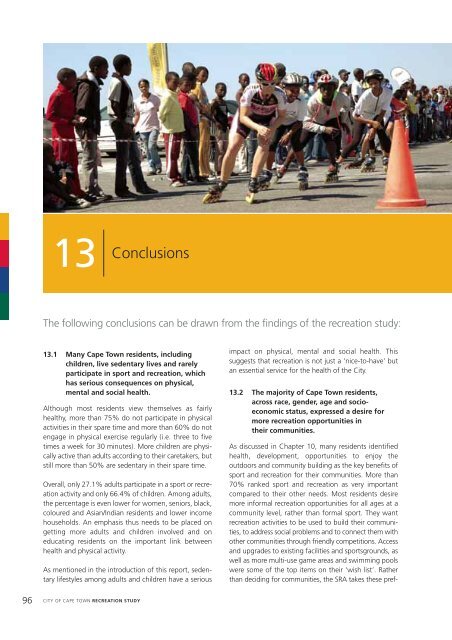FIGURE 7: YOUNG SPORTS FAN AT RECREATION FESTIVAL IN MITCHELLS PLAIN (SOURCE: SRA)13ConclusionsThe following conclusions can be drawn from the findings of the recreation study:13.1 Many Cape Town residents, includingchildren, live sedentary lives and rarelyparticipate in sport and recreation, whichhas serious consequences on physical,mental and social health.Although most residents view themselves as fairlyhealthy, more than 75% do not participate in physicalactivities in their spare time and more than 60% do notengage in physical exercise regularly (i.e. three to fivetimes a week for 30 minutes). More children are physicallyactive than adults according to their caretakers, butstill more than 50% are sedentary in their spare time.Overall, only 27.1% adults participate in a sport or recreationactivity and only 66.4% of children. Among adults,the percentage is even lower for women, seniors, black,coloured and Asian/Indian residents and lower incomehouseholds. An emphasis thus needs to be placed ongetting more adults and children involved and oneducating residents on the important link betweenhealth and physical activity.As mentioned in the introduction of this report, sedentarylifestyles among adults and children have a seriousimpact on physical, mental and social health. Thissuggests that recreation is not just a ‘nice-to-have’ butan essential service for the health of the City.13.2 The majority of Cape Town residents,across race, gender, age and socioeconomicstatus, expressed a desire formore recreation opportunities intheir communities.As discussed in Chapter 10, many residents identifiedhealth, development, opportunities to enjoy theoutdoors and community building as the key benefits ofsport and recreation for their communities. More than70% ranked sport and recreation as very importantcompared to their other needs. Most residents desiremore informal recreation opportunities for all ages at acommunity level, rather than formal sport. They wantrecreation activities to be used to build their communities,to address social problems and to connect them withother communities through friendly competitions. Accessand upgrades to existing facilities and sportsgrounds, aswell as more multi-use game areas and swimming poolswere some of the top items on their ‘wish list’. Ratherthan deciding for communities, the SRA takes these pref-96 CITY OF CAPE TOWN RECREATION STUDY
erences seriously and will use the feedback to developprogrammes and allocate its limited resources in ways thatare in line with what communities want and need.This is most likely linked to the increased attention givento stadiums leading up to the 2010 World Cup.13.5 The demographic profile and responses ofthe survey respondents suggest factorsthat influence their involvement in sportand recreation.Due to the significant differences that were found inparticipation levels and preferences across demographicgroups, it is important to keep the demographics of CapeTown in mind when planning interventions. Overall, thereare slightly more female residents than males, morecoloured residents than black, white or Asian/Indian residentsand among adults, more adults falling in the 26 to59 year-old age bracket than young adults or seniors.Other factors also affect participation levels:FIGURE 104 : CAPE TOWN MARATHON 2009 (SOURCE: SRA)13.3 More priority needs to be given torecreation at national, provincial and localgovernment levels.Given the feedback from residents and the limitedresources available to the SRA, it is evident that morepriority needs to be given to community-based sport andrecreation at national, provincial and local governmentlevels. While many national and provincial documentsexpress support for sport and recreation, few policiesdiscuss recreation in terms of ways to increase participationlevels across different demographic groups. The Cityof Cape Town views sport and recreation as a “vital developmentaltool” but this needs to be given feet throughincreased prioritisation right through to a national level.13.4 Compared to other City services,satisfaction levels with recreation servicesand facilities have not increased over thepast three years, suggesting the need formore prioritisation at a City level.While overall satisfaction with City services has risen overthe past three years (according to the City’s annualCommunity Satisfaction Survey), stadiums are the onlyfacilities falling under the Department of Sport and<strong>Recreation</strong> where residents perceive an improvement.• Disability: Approximately one in twenty residentshave some type of physical disability, with the mostcommon being physical, communication, hearing orchronic illness.• Social problems: The most common socialproblems that were identified in communities arerobbery, poverty and drug abuse. These have asignificant impact on participation in sport andrecreation, particularly in terms of safety, ability toafford programmes or rental fees, time andhealth/well-being.• Transport: Less than a third of residents haveaccess to a car or some form of personal transport,which also makes accessing recreationalopportunities a challenge.13.6 Preferred activities vary significantly bydemographic group.Participation in particular sport and recreation activitiesappears to vary significantly by demographic group,which confirms the need to pay attention to these differenceswhile also looking for ways to find commonground and thereby increase social cohesion and integrationthrough sport and recreation.13.7 There is a large untapped market for Cityprogrammes, since the majority of residentshave not participated in a Cityprogramme in the past year.Only about one in twenty residents said they have participatedin a City programme in the past year. This meansthat there is a large percentage of residents (95%) thatare not yet benefiting from such programmes. Of thosewho have participated in City programmes, approximately56% rated them positively. Looking at thenegative ratings, the key areas for concern were withRESEARCH REPORT JANUARY 201197


